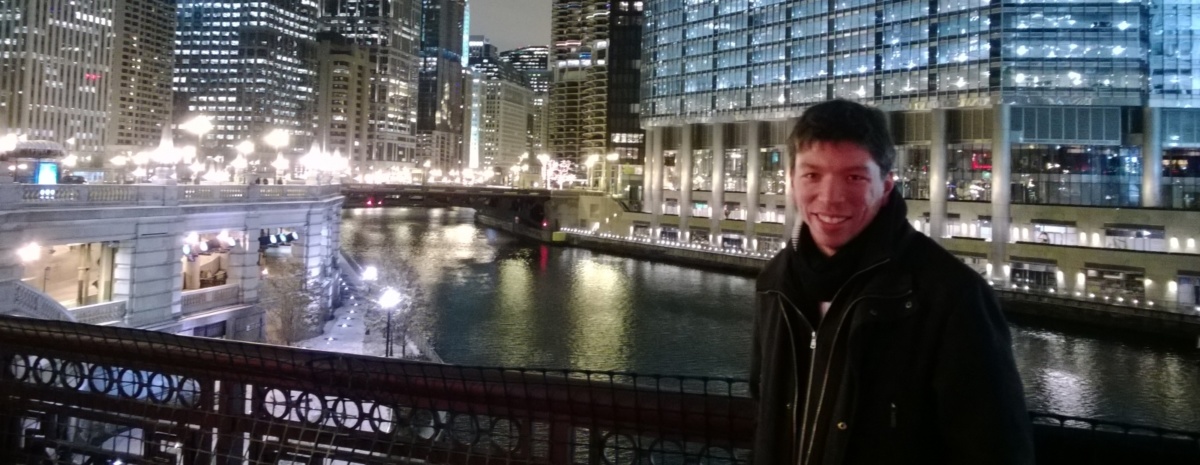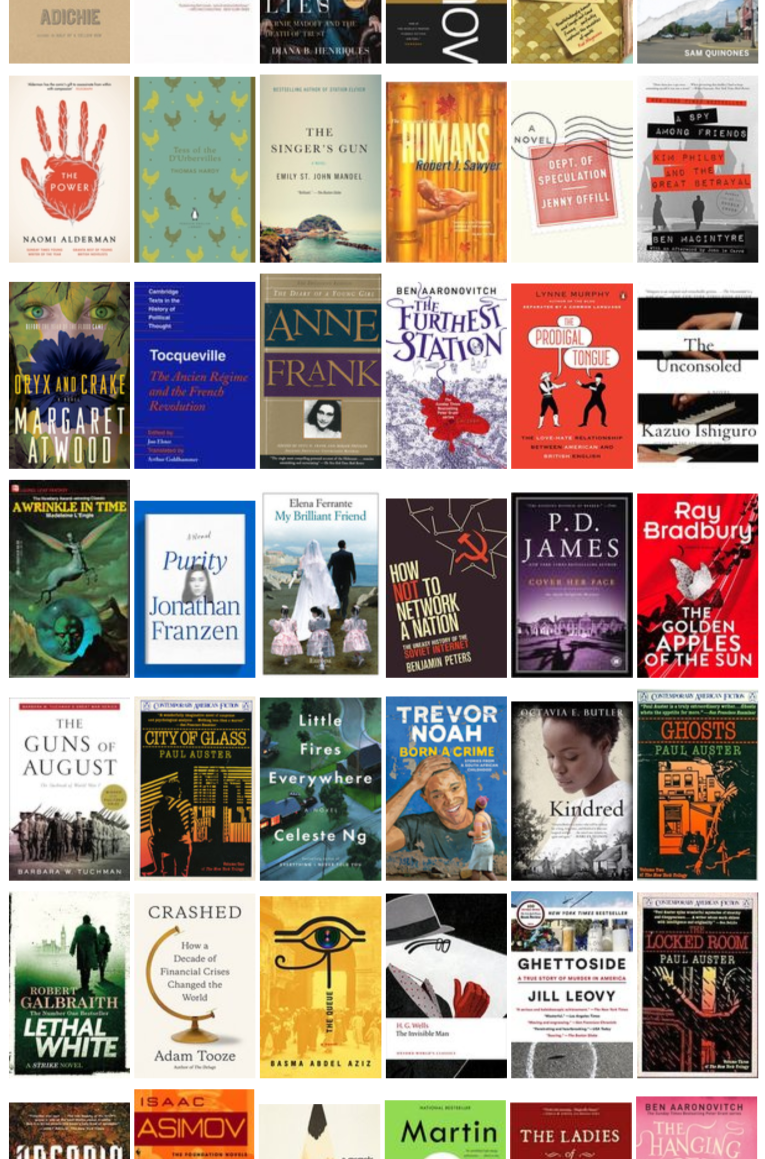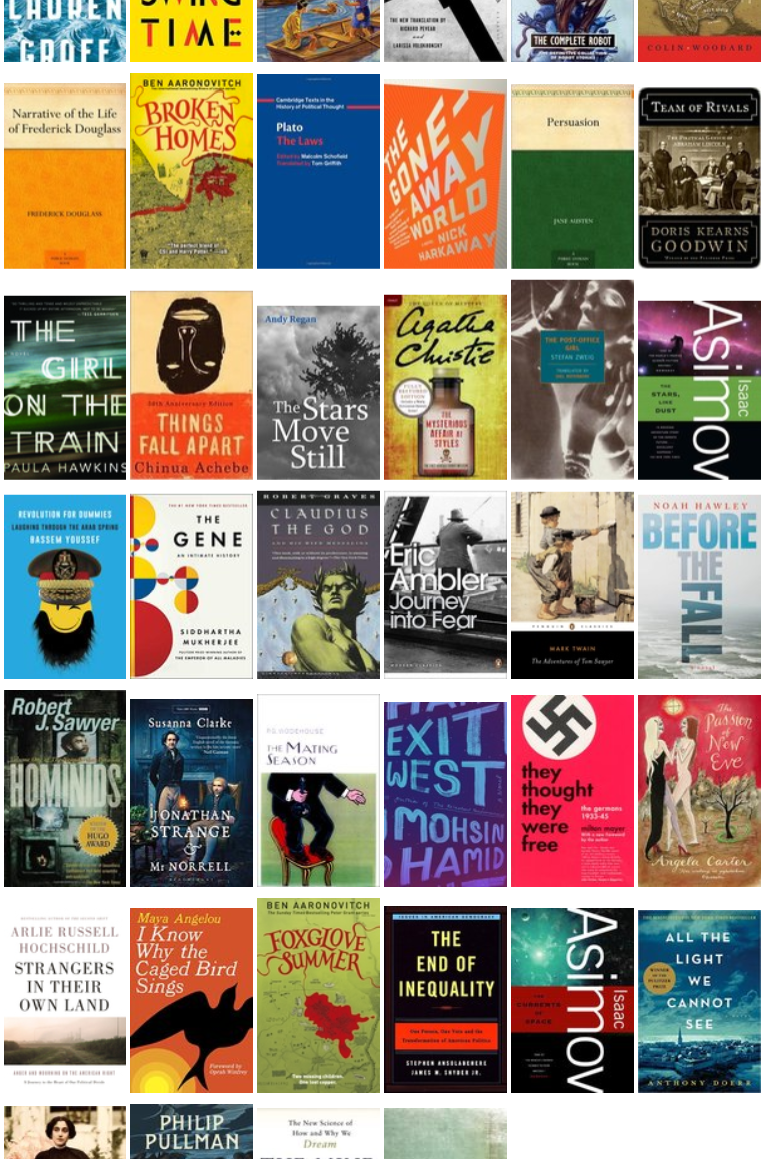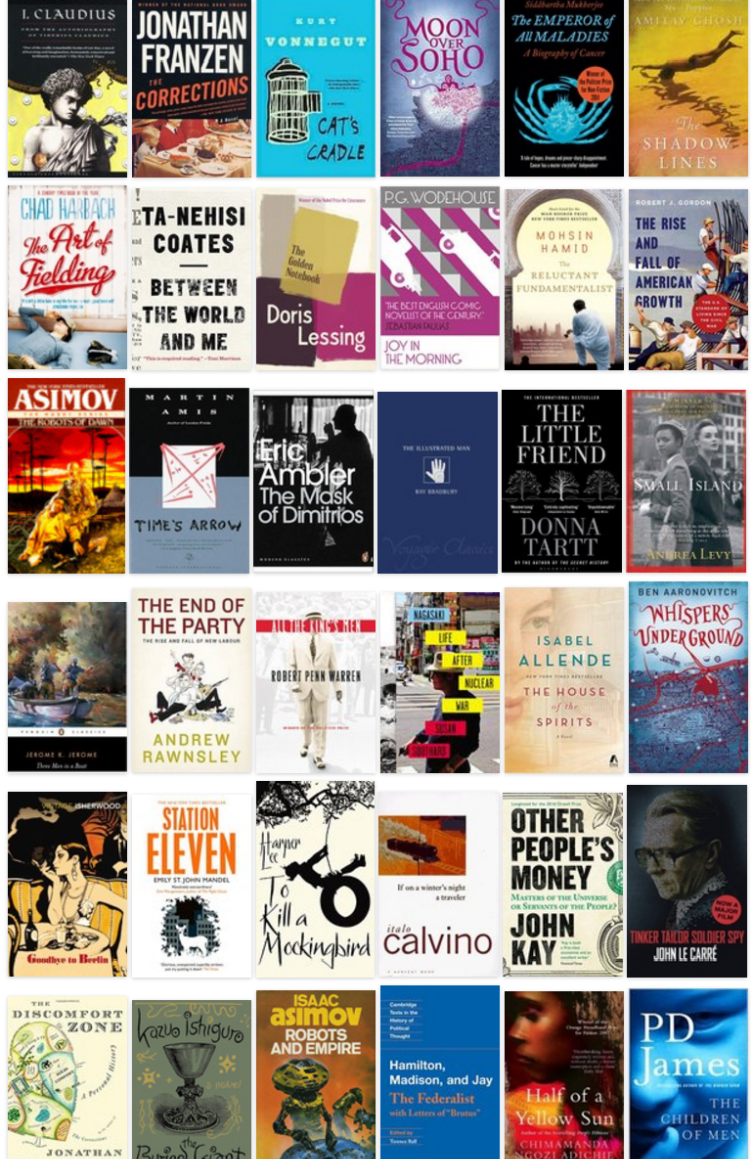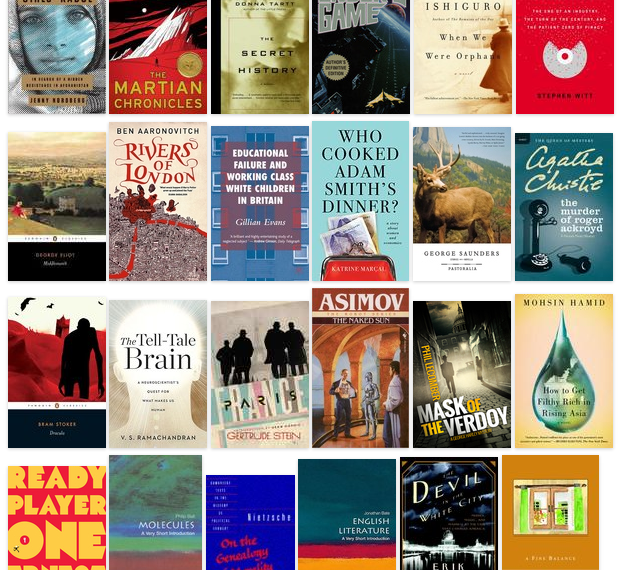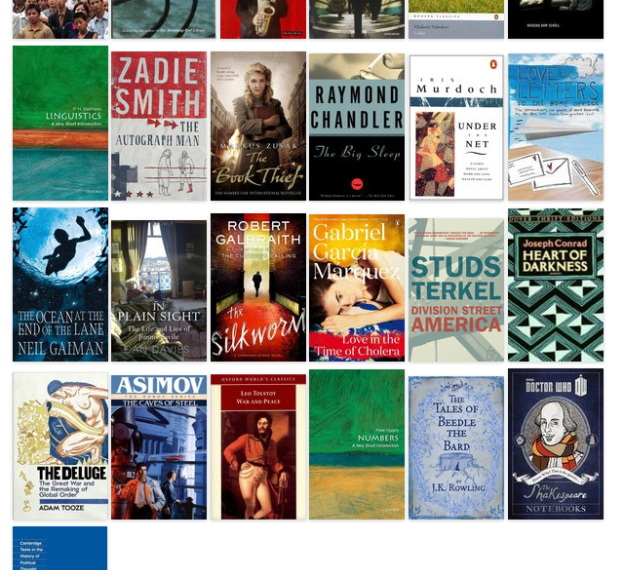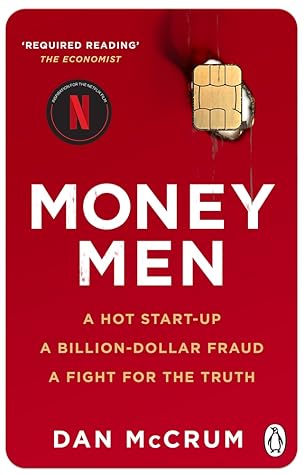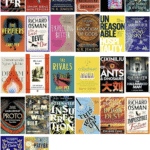Time for the annual book review post, which has grown longer and longer since I started in 2012! For another year running I met my annual target – “at least one more book than last year” – by reading 42 books (a great number) in total. This was definitely made a little easier by having extra free time in December. For 2018 I also instituted an extra rule of alternating between male and female authors after noticing that last year’s bookshelf was pretty imbalanced in favour of men.
Since 2019 is going to be such a transitional year – with all of our travelling and moving back to London – I have decided to take a break from my reading rules and targets. I’m still planning to read – a lot! – but I’ll just see what comes naturally, and maybe go back to normal in 2020. And without further ado, here’s my 2018 bookshelf:
Fiction
I started the year with Americanah, which left me a little flat. People have been surprised by this, especially given how much I enjoyed Half of a Yellow Sun, and it’s not that I have any particular critique of the novel. It was well-written and enjoyable to read but just didn’t leave me with much afterwards. I then moved on to my traditional annual book recommendation from Todd, which this year was The Virgin Suicides. This was an unsettling read, clearly written in a different era, and the collective ‘us’ narrating the book is deliberately creepy. I have to say, I was never into the fetishisation of suicide which sometimes exists among teenagers, and structuring the book around the suicides of five sisters struck me as more totally horrific than maybe it does to a younger audience. Sticking with recommendations: I did enjoy Nina is Not OK, which came via Tash and felt very true to life.
The Power was excellent, centred around the very raw and mostly unspoken question: just how much of the modern relationship between men and women is based on the underlying awareness of physical strength? It reminded me a little of Exit West in that it uses a spark of sci-fi/fantasy to probe a big social question, but does so a lot more successfully. In a similar vein, I was excited to enter Margaret Atwood’s dystopian (and highly developed) world of Oryx and Crake and am looking forward to the rest of the series.
Let’s talk about Tess of the D’Urbervilles, because Tess’s life is really depressing… a shining example of when to just pack up and move to America. It’s impossible not to feel deeply for Tess and the unfairness of her life, and the force of fate which pushes her relentlessly from bad to worse to even worse, even though there are plenty of moments where things are – maddeningly – almost-but-not-quite rescued. The book also paints a vivid picture of English rural life – although, of course, I don’t feel the same sadness about its passing that Hardy does.
When it comes to Ishiguro I can’t stop myself working through his back catalogue, even when it means reading something as frustrating as The Unconsoled. It’s a dream world – that’s all you need to know. The kind of nightmare where space and time is all warped and you keep taking on new missions without ever completing anything. In comparison, I enjoyed reading Purity a lot more but it is also the weakest Franzen book so far, especially once it starts dragging in the second half with the memoir section. Also, can we please institute a complete ban on fictional characters in novels who are authors?
In contrast, Lethal White was so, so good and my favourite of the Cormoran Strike series so far. The novel was satisfyingly long, giving me more time with Strike and Robin after a far too prolonged absence, and the ending was less of a headtwist than usual… not that I saw it coming, but I felt that everything fitted together better plot-wise than the predecessors in the series. More please, JK Rowling, and soon!
I was a little disappointed that American classic A Wrinkle In Time is not actually a time-travel story (more of a space-travel story!) but it was cool as a piece of children’s fiction with a strong protagonist. The explicitly Christian message (and some overly obvious Cold War rhetoric) can be a little off-putting, and it is funny that the big bad is called IT, which now sounds more dreary than sinister. Sticking with the American sci-fi theme, The Golden Apples of the Sun – the third and final anthology by Ray Bradbury in the beautiful collection gifted to me by Katie a few years ago – was another amazing collection of short stories. Almost all of the stories manage to convey a complete, vividly-imaged world in just a handful of pages. The other short story collection I read this year was The Ladies of Grace Adieu, Susanna Clarke’s brief return to the world of Jonathan Strange and Mr Norrell. I enjoyed these fairy tales, but I’m also up for a full-throated sequel.
I’m not really sure how I feel about My Brilliant Friend, which has been extensively recommended. The central characters were certainly interesting and I will keep reading the series to follow their lives, but I wasn’t nearly as gripped as many reviews suggested I should be. Similarly, Paul Auster’s ‘New York Triology’ (City of Glass, Ghosts and The Locked Room) are the kind of unsettling and frustrating postmodern books which are good to read occasionally, but I really don’t love, and I’m worried that the Amazon and/or Goodreads algorithm is going to start sending me more.
The book which really rubbed me up the wrong way, however, was London Fields. I had enjoyed Time’s Arrow so picked this up as my next Martin Amis novel. It is, supposedly, regarded as his “strongest”. But it’s a car crash. Yes, it is well-written, but the good writing is just directed at being snide and cynical for no real purpose. It’s also endlessly racist and misogynistic. At this point I can imagine Amis popping out to complain that I’m being unfair because it’s the narrator character who is racist and misogynistic, not him. No dice. All the vitriol does nothing other than to furnish a vague and confused “state of society” critique for the “end of the millennium” [sic] which had already dated very badly by the end of the actual millennium since the book was written in 1989, anticipates literally nothing of the 1990s and anachronistically chucks in threats of a nuclear war between the Cold War superpowers.
OK, assuming I’ve persuaded you not to read that, what should you read instead? Kindred (a time-travel story from 1979 about a black American woman who finds herself back in a nineteenth century slave plantation) is powerful and very brutal. The Queue is both Orwellian and Kafkaesque, but set in a modern day Middle Eastern bureaucracy which is clearly Egypt. And I want to put in a good word for HG Well’s The Invisible Man, which is a short, fun classic of sci-fi about (unsurprisingly) a man who manages to turn himself invisible. Unfortunately, he turns out to be the worst, most petulant guy imaginable so the opportunity for superhero stunts is entirely wasted.
Finally, a few words for the authors who always make it onto this list. I planned to read Asimov’s classic Foundation years ago but decided to methodologically work through his interlinked Robot and Empire series first. This year I finally got there and while the underlying premise is slightly bonkers, I am reassured to have many books left in the series to enjoy. And I have almost caught up with Ben Aaronovitch’s Peter Grant series! The sixth instalment, The Hanging Tree, felt a little rushed at the end but did move the overarching plot along significantly and entering this world is always a treat.
Non-Fiction
A couple of my favourite non-fiction books this year have been recommendations from Vox’s The Weeds podcast, starting with Dreamland. It tells the intertwined story of the rise of opioid prescribing in the United States (most notably OxyContin) and, simultaneously, the revolutionary ‘customer-centric’ approach of the Mexican heroin trade, for example through salaried dealers who have no incentive to dilute the product. The result has been an opioid epidemic of devastating proportions. An excellent read – perhaps the only thing missing is a deeper examination of the origins of the physical pain driving the initial prescriptions in the first place.
Similarly, Ghettoside told a simple but effective story about murder in the most violent areas of LA. While many people are familiar with police violence in black communities, the other side of the same coin is chronic under-policing where it really matters. Clearance rates for murder are shockingly low, and we know from research that consistency of punishment is much more important for reducing crime than the harshness of the penalty. The homicide detectives in the book have low status even within the LAPD, but justice can’t be done without them. All in all, along with the powerful stories of wasted lives, the book is a good rebuke to the idea that only preventative policing is valuable.
I also really enjoyed Crashed by Adam Tooze – although that’s unsurprising, since I always enjoy his work. This book runs through the decade following the 2008 financial crisis, and the most memorable theme is the poor preparation and reactions of European institutions in general and Angela Merkel in particular. I think perceptions of Merkel are rose-tinted in a world of Trump and Brexit, and she may be personally sympathetic, but it’s still amazing to contrast Europe with the US Federal Reserve. The consequences (most obviously in Greece) have been dire.
I read A Spy Among Friends – about the notorious spy Kim Philby – after being inspired by a John le Carré novel a few years ago. It’s really just totally crazy that the guy running anti-Soviet intelligence for Britain was a Soviet spy the whole time. Astonishing. Sticking with a Soviet theme, How Not to Network a Nation is an interesting story about the aborted creation of a Soviet internet to manage the economy. It reminded me of an Asimov short story about globalised central planning by computer. At the same time, this is very much one of those academic books to which someone has given a snappy title and slapped a nice cover on. I could have done without the repetitive pondering.
The Guns of August is a classic of popular history, but I was expecting something more political. Instead, most of the book is taken up by the military history of the first months of the First World War, and the events which quickly led to a stalemate with no decisive victory for either side. Interesting, but not really the focus I wanted. On the other hand, Anne Frank: The Diary of a Young Girl was absorbing and a really emotional read. Obviously you feel really badly for Anne’s mother, who is treated pretty harshly by her daughter, but I don’t think that makes Anne ‘unlikable’ as opposed to a teenager who was robbed of the time to grow up. The worst part is getting to D-Day: she is so excited that the invasion has begun, while the reader is just counting down the months until August when the family are discovered and the diary stops.
No, I haven’t read Democracy in America yet. Yes, it’s on my list. As a warm up, I read Tocqueville’s The Ancien Régime and the French Revolution instead. His writing (at least in this translation) is very fresh and easy to read, and the key point is worth repeating: “it is not always going from bad to worse that leads to revolution… the most dangerous time for a bad government is usually when it begins to reform… every abuse that is eliminated seems only to reveal the others that remain”. (Admittedly the logic for rulers of bad governments is not great.) Equally, his passage on the feudal nobility – who once possessed greater privileges, and yet were less unpopular because they provided services in return – has interesting implications for government today.
Tara Westover’s Educated (yes, the book on every reading list) was not quite the memoir I expected. Based on her interview on the Talking Politics podcast I was anticipating an upbringing which was extremely cut-off from the rest of the world… but not necessarily one which is so straightforwardly violent and abusive.
Finally, I really loved The Prodigal Tongue, a book about American and British English which grew out of Lynne Murphy’s awesome Separated by a Common Language blog. It’s so nice to read a non-alarmist, well-informed and evidence-based exploration of English in two countries by someone who obviously loves language. Better than 95% of anything else you will read on the topic.
I read a record 40 books in 2017! In an exciting innovation this year, one of these books – The Stars Move Still – was written by my uncle. It’s a fictionalised portrayal of a forgotten American tragedy, and you can buy it now. Let’s take a look at some of the others…
Fiction
As is apparently traditional, I kicked off the year with a gift from Todd: Fates & Furies, two very different perspectives on one marriage which really does make you flip back and re-read sections again in a new light. I was also excited to read Zadie Smith’s new novel, Swing Time, although I found myself much more interested in the central relationship between the narrator and her childhood friend Tracey than the subplot with popstar Aimee.
Early on in the year I also ploughed through The Idiot – it’s only taken me a decade since Mr. Drummond first told me to read it during A-Level history class – and my main takeaway is that Lizaveta Prokofyevna is amazing. I absolutely love her outbursts, and she is very welcome at my literary dinner party. The book is also noteworthy for its discussion on criminality and liberalism, which could easily be written today. It was equally striking to find the actual terms ‘feminism’ and ‘human rights’ in Howards End (from 1910) although the plot and characters were not hugely compelling.
This year I continued my quest through Asimov’s interconnected series, starting with Susan Calvin origin stories in The Complete Robot (along with other memorable robot tales) and continuing through his Galactic Empire books. They are always enjoyable! I also read another two instalments in the Peter Grant series, Broken Homes (a big twist of an ending!) and Foxglove Summer (a detour into the countryside). It’s been a much longer gap since I last read anything from the His Dark Materials universe, but La Belle Sauvage – the first in a new trilogy – was a joy. The story is small in scope, but a confident return to the world of dæmons and Dust.
Abbi’s sci-fi recommendation, The Gone-Away World, was a post-apocalyptic wild ride with definite shades of Vonnegut. Jonathan Strange & Mr Norrell, which had sat forebodingly on my to-read list for a while, is a giant tome but with an incredible premise and story. Susanna Clarke crafts a compelling alternative history of England divided between Northern and Southern kings, with a lot of folklore, huge attention to historical detail and magic which is beautifully integrated into the world.
However, my favourite piece of speculative fiction this year was Hominids – a story about a Neanderthal man who accidentally crosses over from a parallel universe in which Neanderthals survived rather than humans. I feel a little guilty naming this as my favourite because as a work of literature it is definitely not the best. There’s a definite ‘genre sci-fi’ feel where interesting ideas and discussions take precedence over plots or characters, not to mention a clumsy rape scene which is not handled well. Despite all of this, I just really really wanted the whole thing to be true so that I could talk to a Neanderthal. The impact of small biological differences between the two species, such as a stronger Neanderthal sense of smell, are fascinating when the author imagines how their civilisation would differ as a result. And it left me feeling a bit bad about being a homo sapien. I will never use ‘neanderthal’ as an insult again.
I am pathetically bad at predicting where a plot is going to go, so it was exciting to be able to read The Girl on the Train and work out the killer for myself, albeit taking 70% of the book to get there. Eric Ambler’s Journey Into Fear was another straightforward thriller, and super enjoyable. Before The Fall was also a compulsive read, piecing together the mystery behind a plane crash, although the ending was a little anti-climactic as various open plot threads and red herrings were left hanging open.
I confess that I only made a note to read Narrative of the Life of Frederick Douglas after Trump memorably said he was doing an ‘amazing job’, but everyone should take the time to read this searing first-hand account of American slavery. To continue the theme of reading good books for bad reasons: I was spurred into reading Maya Angelou’s I Know Why The Caged Bird Sings by a 1-star Goodreads review in which the mother of a 15-year old boy objects to the ‘sordid details’ he is ‘forced’ to read about for school. She finally compromises by telling him ‘which chapters to skip’. I guess I owe this woman something, because I deeply appreciated reading and learning more about Angelou’s amazing life, which I hadn’t realised the book was so closely based on.
Growing up in the UK I was never ‘forced’ to read American classic The Adventures of Tom Sawyer, but I did so under my own free will this year and enjoyed it once the action picked up. The Passion of New Eve was a blast of Angela Carter: violent and sexual and liable to fuel the flames depending on how you see it. My mum suggested The Post-Office Girl, full of vivid descriptions of places and characters, and by the end I was quite keen to see whether the heroes would be able to pull off their crime or not. Exit West is a (somewhat obvious) metaphor for the era of global migration we are living through, but I actually found the birth and death of a relationship to be the most moving part. Finally, All The Light We Cannot See was a beautifully written and fast-paced intertwined story of a blind French girl and a German boy during World War Two. It made me sad about Brexit all over again.
Non-Fiction
The only American history I ever studied was all post-Civil War, and so I found American Nations to be incredibly helpful in understanding how the United States was first put together. I had no idea that the slave system of the Deep South migrated from Barbados, for example, or the sharp distinctions between the New England Puritans and the Virginian gentry which can be traced back to the English Civil War. Meanwhile, it is easy to forget the Spanish settlements in Florida and New Mexico which get lost in all of the ‘East to West’ narrative. I am sure you can quibble with exactly how Woodard carves up the country, but overall I have a much better grasp of its distinct cultures and histories.
Jumping forward in time to Lincoln, Team of Rivals – which took me a month to get through – is a very detailed account of his rise to the Presidency together with his leading competitors. It was well worth reading although I was expecting a little more historiography along with the narrative, and I still have some unanswered questions. For example, was Lincoln actually any good as a war leader? The Civil War certainly reads like a series of military disasters in the beginning, although perhaps the whole government would have disintegrated under anyone else.
Rounding out the American history, I also read The End of Inequality, a click-bait title for what is actually a fairly dry piece of academia on the (genuinely fascinating) 1962 Baker vs. Carr decision. Save yourself some time and listen to the More Perfect episode instead. I am also down on this book because in the last few pages they become fabulously stupid and wrong about international solutions to gerrymandering.
If you want a chillingly relevant insight into the ‘anti-politics’ mood, They Thought They Were Free is based on interviews with ten ordinary Nazis from a quiet, non-industrial German town conducted right after the Second World War. Similarly, not because they are Nazis but for a a comparable bottom-up perspective of the modern American right, I highly recommend Strangers In Their Own Land. Arlie Hochschild, a sociologist from Berkeley, does an excellent job talking to conservative voters from rural Louisiana, and smartly uses the issue of local environmental damage (from which these people suffer a great deal) to probe the question of why they continue to oppose any government protection or regulation.
Finally, if you want to panic about a different social nightmare, read The Gene by Siddhartha Mukherjee. As with his previous book on cancer, The Emperor Of All Maladies, this is a fascinating and informative exploration of the history and science of genetics. But I came away with a terrible sinking feeling about where genetic engineering is going to lead us. Alternative, there’s always the equally dark world of Plato’s The Laws, in which Plato (a) sneakily tries to make his own book compulsory reading material, (b) bans discounting (thanks, dude) and (c) limits his city’s population to 5040 citizens exactly. Good luck with that.
I am really, really pleased with the books I read in 2016. And I tried to get better about making some quick notes as I did so… partly to remember more, and partly to make writing this review easier at the end. Let’s see how well I did!
My first book was I, Claudius, an incredibly bloody underdog story gifted by Todd. (Spoiler alert: just about everybody is murdered by the end.) Other Todd-influenced reads this year included The Corrections, an absorbing family drama and ‘state of the nation’ book, and The Art of Fielding which left me forever fearful of getting struck in the face with a baseball. It’s an interesting story because every single character is basically good and well-intentioned, yet everything falls apart anyway.
I also had high hopes for The Little Friend but found it much less cohesive than last year’s The Secret History. That said, many of its scenes and characters have remained vivid in my memory – Hely trapped in the apartment with the snakes, for example – and my research for this post suggests the murder-mystery aspect isn’t left quite as unresolved as I had thought. The main character, Harriet, has an obvious forerunner in To Kill a Mockingbird‘s Scout: a classic child’s-eye perspective which I finally read this year.
I really loved reading Asmiov’s Robot series, more so each time, which I concluded this year with Robots of Dawn and then Robots and Empire. Not only was the latter a well-timed piece of post-Trump escapism, but it also serves as Asimov’s bridge between previously distinct series, and I am eager to keep going next year. It also took some effort to limit myself to reading two of Ben Aaronovitch’s moreish Peter Grant series (Moon Over Soho and Whispers Under Ground). It’s hard not to love something infused with so much London. The Illustrated Man was another collection of Ray Bradbury’s wonderful (and mostly creepy) short stories, tied together with an unsettling framing device.
After a weaker Ishiguro last year, The Buried Giant was one of my favourite books of 2016. Following the journey of two elderly Britons, Axl and Beatrice, the book is set in post-Arthurian Britain (a time period I rarely think about) in which memory is mysteriously suppressed and an uneasy peace holds between Britons and Saxons. Its opening was so intriguing and the book held me rapt throughout. For fans of Ishiguro’s style, this is highly recommended. And on subject of Ishiguro, The Reluctant Fundamentalist is aptly compared to The Remains of the Day for its gripping first-person narrative style which drives it towards a suspenseful thriller of an ending.
Another of my favourites this year was Station Eleven, a good old-fashioned post-apocalyptic dystopia (plus travelling Shakespeare troupe) which I raced through. Cat’s Cradle was a much better Vonnegut than my last attempt, and the concept of a granfalloon actually occurs to me a lot now. Time’s Arrow, a novel in which a Nazi doctor’s life runs in reverse, will mess with your head and convince you that real life is also running backwards. And I was initially very into the postmodern If on a winter’s night a traveller although there is something undeniably frustrating about a succession of cliffhangers from different imaginary books, even if the ending comes with a nice ‘a-ha!’ moment.
I feared getting lost in the magical-realist epic The House of the Spirits but was kept engaged by the intertwining of real Chilean history, which I really appreciated learning more about. Similarly, I learnt about Biafra and the Nigerian Civil War in the 1960s through Half of a Yellow Sun, Chimamanda Ngozi Adichie’s engaging but slowly devastating book about the conflict. All the King’s Men wasn’t quite my style, but is apparently modelled closely on an interesting figure in Louisiana political history. (Oh, for the days when a populist American demagogue would at least build some hospitals.)
Turning to non-fiction, The Emperor of All Maladies – billed as a ‘biography of cancer’ – taught me so much about a vast subject which I had never really considered before. Perhaps the most important lesson is how unstraightforward medical ‘progress’ is. You might imagine that the history of cancer treatment is one of slow, incremental improvement… but it’s just much more complicated than that, with many intellectual dead-ends and ‘breakthroughs’ which come with horrible trade-offs. And yes, I did read some of this on a beach.
Prompted by Brexit, it felt like the right time to revisit the New Labour era in Andrew Rawnsley’s gossipy The End of the Party which documents the full destructive force of the Blair-Brown relationship. It seems like such a long time ago now. The Rise and Fall of American Growth was a much drier read, as you might expect from economic history, but it makes one side of an important argument about the uniqueness of the twentieth century. It also led to me boring people at work for weeks with random factoids, for which you can blame ‘The Weeds’ podcast for recommending it in the first place. One annoying spot in a generally magisterial work, albeit sadly common to many discussions, is the breezy assumption of ‘more marriage’ as a social good with no real nuance or consideration.
It was also good timing to read The Federalist (with the opposing Letters of Brutus, which makes some prescient predictions about the Supreme Court) straight after the election, at the very moment when Hamilton’s Electoral College defence started popping up all over Facebook. The Papers were written to urge adoption of the newly written US Constitution and defend it from accusations that too much power was being centralised, which puts me in a weird position as someone who looks at two-year terms in the House of Representatives, for example, and thinks ‘that’s absurdly short’ as opposed to ‘that’s long enough for tyranny to strangle the liberty of the people’. So I guess it made me more sympathetic to the Constitution (never my favourite document) as an achievement over nothing at all.
But a more important perspective on these events can be found in Ta-Nehisi Coates’s Between the World and Me, a series of letters to his teenage son about the history of race in America and what it means for him. This is somewhat difficult to write about, given that only yesterday I heard Coates speaking about his frustration that the unexpected popularity of the book amongst white liberals ends up hurting his ability to write and think and explore freely. And we need that. So I will limit myself to the two most memorable things which I took from this book, which you should read. One is the moral clarity that people in the past “didn’t ask to be your martyrs”: pain and suffering by some cannot be ‘made good’ to others. The other, more personal, is his description of an incident with his five year-old son on an escalator. It is one of the most powerful things I have ever read.
Rounding off the non-fiction was Other People’s Money (a persuasive reminder that we have far more financial activity than we need) and Nagasaki: Life After Nuclear War. Susan Southard’s account of the 1945 atomic bombing, and the lives of its survivors, was at times so horrific that I had to stop reading it on a plane for fear of passing out. But it is a worthy discussions of events which are usually discussed in the abstract.
After a dip in 2014, this year I returned to my upward curve for number of books read. And yes, while caring about the raw number is silly, it’s also a good motivator to do something I really enjoy but otherwise struggle to make time for. And I read some great things in 2015…
I’ve seen plenty of interesting authors interviewed about their books on The Daily Show over the years, but I rarely manage to follow-up by reading them. Something about Bryan Stevenson was compelling enough to buck this trend, and his account of working as a lawyer to overturn horrendous miscarriages of justice in the American South – Just Mercy – was one of the most powerful and important things I read this year. It’s about a whole lot more than the death penalty, but the image of a prison officer strapping a defenceless human being into a chair and executing him – at the behest of the state – is one of the most jarring and frightening intrusions of barbarism into the modern world I can imagine. I think there is validity to the argument that we over-praise democracy and under-appreciate the rule of law, and in a world where entirely innocent people can be arrested, convicted, imprisoned and killed, both are denied.
Another Daily Show recommendation was The Underground Girls of Kabul, which tells the fascinating story of bacha posh: girls raised as boys, at least until adolescence, for both ‘luck’ and raw practicality in cultures where being born female is so bad it can make your mother weep. A useful reminder both of the constructed nature of gender, and the hidden adaptations and compromises which ‘real people’ always make below the surface of a society. Another book about being born in the wrong place at the wrong time was the classic There Are No Children Here (a gift from Robert) which follows two young boys growing up in Chicago’s prison of poverty and violence. It’s really not far away. And in turn, Educational Failure and White Working Class Children in Britain (Tash’s recommendation from years ago) well articulates social class in Britain, which can be hard to explain to people here.
On a more upbeat note, Rivers of London – recommended by Diamond Geezer a few times on his blog – was a rough but promising Gaiman-esque urban fantasy, and sets up an intriguing series to follow. Ready Player One was even more fun: a page-turning young adult adventure which appealed to someone with only conversational fluency in 1980s pop culture. It certainly left me more uplifted than the similar Ender’s Game, which others feel passionately about, and is a good read but also surprisingly chilling and sad. I am a little intrigued to see what happens next, but I won’t be rushing. It’s the same story with Mask of the Verdoy, which attempts to kick off a series of 1930s London detective stories, but wears its amateur historian heart a little too closely on its sleeve. (Please don’t put dialogue into Ramsay MacDonald’s mouth unless you really know what you’re dong.)
A few books were return visits to worlds from previous years. I’ve loved all of JK Rowling’s Cormoran Strike series, but the third entry – Career of Evil – improved on its predecessors with a satisfying ending to the murder plot as well as the usual enjoyment of being among Robin and Strike. In the same vein, I very much enjoyed Agatha Christie’s fiendishly clever ending to The Murder of Roger Ackroyd. Something Fresh was my first non-Jeeves PG Wodehouse book, and while it didn’t make me laugh quite as much, I will certainly be back for more. Asimov’s The Naked Sun, the second in his Robot series, was better than the first and sketched a memorable portrait of an elite society with a crippling phobia of human contact. My other classic sci-fi of the year, Ray Bradbury’s collection of short interlinked stories The Martian Chronicles (thanks, Katie!), was also wonderfully alien and spooky. I’ll be back for more of him, too.
I had put off reading Dracula for years, but it was surprisingly fluid and gripping, at least for most of the way through. The much-discussed ‘undertones’ of Victorian sexual fears are not so much undertones as raw panic – at one point sweet, wholesome Mina is forced to her knees to suck Dracula’s blood out from his chest while her humiliated husband lies unconscious – but you didn’t expect today’s mores from the granddaddy of nineteenth century Gothic horror, did you? At least Mina has a pretty happy relationship when she’s not being drained to death. The experience of Dorothea in Middlemarch, by contrast, is a sad reminder of the Victorian ‘cross your fingers and hope for the best’ approach to marriage for women. I was more enthralled than I expected to be by George Eliot’s long but well-paced classic on provincial life. And then every so often I would pause to give sincere thanks for dating and contraception.
This year I also got around to Crime and Punishment. No doubt Dostoevsky is masterful at getting under the skin of his jumpy and degenerating protagonist, Raskolnikov, but he also hits you in the face with Christian salvation a little too much for my liking. And most of said salvation is delivered by poor Sonya, who becomes inexplicably devoted to her best friend’s murderer. (She’s a prostitute, so her devotion to others is supposed to act as her own redemption, except today it’s hard to conjure up any feelings of condemnation and so she becomes purely a martyr.)
Two American novels which Robert and Todd both suggested – Jonathan Franzen’s Freedom and Donna Tartt’s The Secret History – were both great. The Secret History is the greater of the two, I think, mostly because I was successfully ensnared into mentally egging on the murder before being dumped with real feelings of horror and guilt afterwards. Freedom has become hazier in my mind over the year, although I do remember thinking it shared a literary style with Zadie Smith. And Pastoralia, George Saunders’s collection of brisk (and often weird) short stories satirising modern life, was another recommendation (thanks, Katie Schuering!) I will gladly pass on to others. Gertrude Stein’s Paris France was also odd but breezy: like going to lunch at a café with an eccentric aunt, whose observations on life are mostly ludicrous but pleasant enough to listen to for a bit. On the other hand, The Fortress of Solitude – a Brooklyn-based coming-of-age story – was more of a slog.
In the late nineteenth century, in Chicago, Herman Webster Mudgett built a hotel to host visitors to the Chicago World’s Fair. The ‘castle’ took up an entire block and was designed to be as confusing as possible: a maze of rooms at odd angles with staircases leading to nowhere and doors which could only be opened from one side. The whole point was to allow Mudgett, also known as H.H. Holmes, to murder young women who visited from out of town, several of whom he married first. The story of H.H. Holmes is, without doubt, the only reason anyone ever picks up The Devil In The White City. That it is intertwined with a moderately-interesting account of the design and construction of the World’s Fair itself will be either a pleasant surprise or an annoying deviation, depending on taste.
Some short takes: When We Were Orphans is no one’s favourite Ishiguro novel (least of all his) and threw me into a bit of a funk when reading it, but a bad Ishiguro book is still a pretty good book. Who Cooked Adam Smith’s Dinner? (answer: his unpaid mother) is a witty, feminist critique of homo economicus. I suspect the author would appreciate the themes of maternal self-sacrifice in Please Look After Mom, partly notable for being written in the second person. I chose The Tell-Tale Brain as a follow-up to Phantoms of the Brain, which I read years ago, and if you decide to join me you will spend days trying to shoehorn interesting neurological studies into unrelated conversations. I’ve read numerous variations of the Asian rags-to-riches-to-rags story which is told in How To Get Filthy Rich In Rising Asia, but this is a good and moving one. A Fine Balance, set during India’s ‘Emergency’ period of the mid-1970s, is a more demanding read but also a beautiful, sad story with wonderful and memorable characters. I grew very attached.
Finally, while it’s a terrible cliché to enjoy Nietzsche, it is very hard not to. He’s sharp and insightful, weaving a great historical narrative out of clever linguistic details (e.g. what is ‘good/evil’, and how does it differ from ‘good/bad’?) and, when he gets worked up, he can hold one hell of a shouting match with himself. One thing Nietzsche can’t do, however, is hold a candle to George Orwell. And so I want to conclude this lengthy review with praise for him, who can be enjoyed in Penguin’s collection of essays. Orwell possessed such a wise, prophetic and independent voice that he is admired and respected – without misrepresentation – by both the left and the right. But you should know, if you’ve only read his famous novels, that Orwell does a marvellous line in cultural history. He cares about comic books, murder mysteries and cooking – and he cares about how, and why, they change over time. He understands patriotism, understands how people think and behave (just read, for example, his description of which books are borrowed from libraries versus which books are bought from bookshops) and he does it in the finest, clearest prose. For Orwell, good writing is a political act, and he makes me feel illiterate. I wish he were still around to consult.
Confession: this year, I failed in my reading target of reading ‘at least one more book than last year’, which would have required a minimum of 31. I could make several attempts to excuse myself, not least an abandoned effort to read the King James Bible which consumed many hours, and the distractions of moving. Nonetheless, here is my year in books:
It started out well, with The End of the Chinese Dream. I’d been looking for a good book on China for a while and picked this intimate study of the hopes, dreams and fears of Chongqing residents over a general sprawling history. It’s particularly memorable for its account of using a traditional Chinese ‘wishing tree’ to subvert government restrictions on surveys. There’s a much broader narrative to Adam Tooze’s The Deluge, a history of the global political reshaping which followed the First World War, which I wanted to read something about in this centenary year. (Fun fact: once upon a time, I went to Tooze’s ‘Economics for Historians’ lectures.) Suffice to say, I really enjoyed this, and recommend it to anyone interested in how and why the twentieth century turned out as it did.
More surprisingly, another piece of non-fiction this year which really stuck with me was Addiction By Design – Natasha Dow Schüll’s study of machine gambling in Vegas. I think I read this after an extract in The Guardian happened to catch my eye, and I found it completely enthralling. Not being a gambler myself, I had always assumed that the pleasure of a place like Vegas would come from the thrill of taking risks. In fact, the majority of casino revenue is now made up of gaming formats which are geared to precisely the opposite: routinised, almost trance-like experiences at slot machines. A work supported by years of research, the author deserves credit for making it so accessible to a general audience.
I’ve focused on non-fiction so far, which is where a lot of my hits of 2014 turns out to be, but there was a lot of good fiction stuff too. The Line of Beauty drew me into its world and served up some of the most well-written sex scenes I’ve ever read (your mileage may vary, but I remember being pretty struck by them). Heart of Darkness is a justified classic, obviously, and well conveys the dark and the terrible of European colonisation. The Caves of Steel was the first Asimov book I’ve ever read and, apart from being clever, imbued me with a strong, false nostalgia for the science fiction of the 1950s, and the kind of futures they imagined. The Ocean at the End of the Lane was vintage Gaiman: I’m not convinced it had much that was new, but I’m always a sucker for the twisted fairytale world he creates. And much of the pleasure of The Silkworm was the comfortable feeling of being allowed back into a JK Rowling book series, with characters you already know and love, ready for another adventure.
On the other hand, The Autograph Man was (as everybody warned me) Zadie Smith’s least best, and meanders around the lives of some fairly unlikeable but also unremarkable characters. I wasn’t particularly taken in by The Big Sleep: it was fine, and scratched an itch for a hard-boiled American detective, but I’m not in a rush for more of Philip Marlowe. Under The Net has somewhat slipped out of my brain, although I think I understood something from it at the time. The Book Thief was simplistic but moving. Love in the Time of Cholera is all about the writing, and that always stays with me less than plot, meaning that now when I look back I draw a blank although I remember enjoying it at the time. One thing which did stay with me was Lolita, so I’m glad that I tried again with this book after abandoning it halfway through a few years back. The first half is still much better, but it’s worth reading alone for Humbert’s skilful self-justification, all the creepier for its certain seductive power.
Oh yes, and late this year I also read War and Peace. I’m pleased that I did. Big epics usually take some time to get into, especially with so many characters, and this was no exception. But since the first thing most people say about War and Peace is how long it is, I have to say that it didn’t feel so long, especially once I could devote proper stretches of time to it. So, why bother? Well firstly, I knew next to nothing about Napoleon and the Napoleonic wars, so Tolstoy proved very instructive. The characters are pretty memorable, especially Natasha – after whom my sister was named! – and there are a couple of moments (especially during the war sequences toward the end) which hit you hard. He also throws in a couple of great quips.
Many congratulations to Simon for appearing in the essay collection Going Underground. And many thanks to Christa, whose gift of Division Street America was not always easy to read, and often melancholy, but an important insight into the city of Chicago. Love Letters to the Home Office and The Life and Lies of Jimmy Savile I have written about elsewhere.
And finally, for anyone who’s still reading: sometimes, for whatever reason, something you read enters the ‘random useless fact’ part of your brain and stays there. So allow me to share two entirely unrelated things which I found interesting in my reading this year. Firstly, courtesy of Linguistics: A Very Short Introduction is the Tuyuca language of a small South American people. It’s one with mandatory evidentiality, which means that the grammar of the language requires you to specify how a statement is known – whether visually, nonvisually, secondhand or through being apparent or assumed. (Comparably, for example, English often forces you to specify whether a noun or singular or plural: you can’t ‘pick flowers’ where the number of flowers may be 1.) But just think how much more precise the news would be if we spoke Tuyuca, eh?
Second fact, this time from Rousseau: the Polish-Lithuanian parliament of the 16th-18th centuries had a procedure known as the liberum veto. If any member invoked it (by shouting “Nie pozwalam!”, Wikipedia claims), then it didn’t just crush the legislation being debated, it also brought the session to an immediate end and voided everything which had already been passed in that session already. For anyone who despairs at the banality of Republican obstructionism in the US Congress, take some comfort in the fact that at least they don’t have the liberum veto. (Rousseau wasn’t very impressed, either. He called for the death penalty for anyone who tried to use it.)
